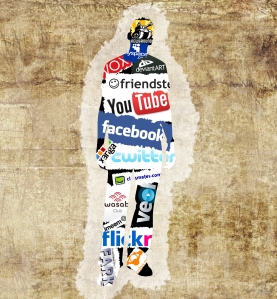Could you imagine life without the internet? In our society today, the use of social media has become inevitable and we depend on it for many things. We use it in our schools, workplaces, and even in our free time. People love the internet because it is their own free space away from the rest of the world that they can control. For teenagers like me, it is an environment away from our parents where we can freely express ourselves with no limits. Without the internet, many people would feel lost, and daily life would be disrupted. Most people depend on computers for even doing the simplest task. Computers are also used for chatting and social networking. There are many positive aspects of social networking. For example, it is very easy to reconnect with old friends or even make new ones. However, you could also argue that it is the portal to a dangerous online world filled with many consequences. Many people, teenagers in particular, overlook the harmfulness of social media simply because we either ignore it or believe bad things will never happen to us. We continue to treat websites like Facebook as their diary and post too much information. They also post inappropriate content such as pictures of drinking alcohol from parties or the use of drugs and gossiping about peers. From a teenage perspective, this “bad behavior” is not really inappropriate. However to an adult such as a parent, future boss, or a teacher this is unacceptable. From research, surveys, and personal interviews we will explore why teenagers reveal so much information online some reason include conformity to maintaining a reputation, why the warnings associated with social networking are usually ignored, and explore some of the consequences. Also, because social media has become very popular in our generation we are discovering how this has an impact on today’s youth such as creating an “awkward generation”.
Why do teenagers post so much information online?
From a teenage perspective, it is easy to be a victim of revealing too much information on social media. For starters, some teenagers often treat websites such as Facebook or Twitter as their dairy. Teenagers easily displace their emotions online without thinking about the consequences. If you’re mad at your friend or your mother, it is easier to “tweet” what you feel rather than to tell the person what you are actually feeling. For example, yesterday on my Twitter timeline (a place where you can view everyone’s tweets) I witnessed an argument between a couple that goes to my school. The girl was upset at her boyfriend and instead of directly talking to him she “subtweeted” him. On twitter, subtweeting is shortening of “subliminal tweet” which is directly referring to a particular person without directly mentioning them. The boyfriend found out and he publicly replied to the subtweets with violent language and fury. This is an everyday example of how teenagers easily put too much information on Twitter. This problem would have been avoided if the couple confronted each other in person. Instead, they went on Twitter to solve their problem which as a consequence only created more drama.
Another reason why teenagers post too much information online may be to feel “cool” or socially accepted. Most teenagers associate alcohol and drugs as being cool and socially accepted. They display these pictures of them involved in such activities and post them online so the outside world can see how “cool” they are. When they post such pictures, rarely do they think about if an adult could see them or if their future is at risk. All that matters is that in the social hierarchy of high school, they are ranked high because they post these photos. Why being cool is associated with drugs and alcohol may be because many of us teenagers strive for an “adult look”. In American society, such substances like liquor and cigarettes are connected with an adult image. Teenagers always want to rebel against such laws that forbid us as being viewed as adults in the world. Of course we are repeatedly warned of the risks of smoking and drinking, but our need to feel “cool” and desire to be viewed as an adult leads us to ignore the consequences.
Tune in next article to find out an interview between me and a “popular” and “nerd” kid about posting inappropriate picture on Facebook.


Posted on May 14, 2012
0